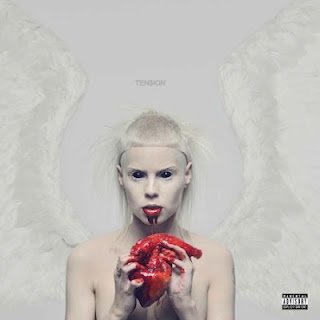Ten$ion is not a bad name for a Die Antwoord album. The appeal of the Cape Town hip-hop duo (trio if you count their perpetually identity-shifting beatmaker DJ Hi-Tek) has stemmed from a sort of cultural dissonance, a subversive slant that the internet intelligentsia quickly couched in terms of “performance art” or even Dada. This particular tension boils down to a question of “realness” vs. “falsehood,” a zeitgeisty little dichotomy that an overzealous writer of pop-crit fluff-pieces might slot into other “discussions” of Adele vs. Lady Gaga or Lana Del Rey’s lips. But such belabored treatment of the role of brazen artifice in pop music doesn’t really have anything to do with Die Antwoord’s popularity; since their emergence in January 2010, the real tension driving their rising profile has been one between the familiar and the foreign, the American and the Afrikaans.
A Google Trends search reveals that the peak of their digital exposure came with the release of their video for “Evil Boy,” which distilled both the overbearing “transgressiveness” and exoticism of their aesthetic. Furnished with props by the effects team behind Neil Blomkamp’s District 9 (a film that leader Ninja, a.k.a. Watkin Tudor Jones, strained to connect Die Antwoord with in interviews), prominently featuring a Xhosa rapper, and bolstered by the production work of Diplo (a notorious collector of the “exotic” whose co-opting of Brazilian favela music skirts the line between appreciative and exploitative), the clip barrages its viewers with the “Africanness” of Die Antwoord. The trilled Afrikaans “r”s of rodentlike yet ultimately tantalizing femme-rapper Yolandi turn an otherwise pedestrian “satanic seduction” verse into something more sonically alluring. Hooded tribesmen with machetes crowd the frame, playing to our Mondo Cane repulsion at “barbaric” rituals. The Tokoloshe, Zulu bogeyman, looms with a floppy erection.
Yet over the past year, after spending time in L.A. within the mechanisms of the music industry, Ninja and Yolandi have shifted the focus of their work towards a more direct skewering of American pop convention, a move that perhaps explains the chillier critical atmosphere surrounding Ten$ion. Within the three minutes of the album’s opening salvo, Die Antwoord have already subjected us to a pretty comprehensive survey of contemporary Top 40 gimmickry: a soupy string intro, a dubstep drop that hits your ears like the gulf oil spill, touches of “Telephone” stutter. Even Ninja’s already put-on “Zef” accent has become further Americanized, the rising, nasal cadence of his voice now a studied Eminem impression. While lyrics and song titles still reference their homeland, Die Antwoord have turned their attentions to the US. “Zefside Zol” overtly riffs on Missy Elliott’s “Work It,” the “feel good gangsta” production on “So What?” turns out to be an attempt at 90s boom bap, and Ninja tries his best New York mobster on “Uncle Jimmy.” Even more tellingly, the album’s most transgressive moment comes via a Mike Tyson quotation that exploits America’s discomfort/fascination with the word “faggot.”
When largely stripped of exotic Afrikaans trappings, the music of Die Antwoord becomes more clearly, consciously terrible. In that sense, this is probably their most successful album, a work that can’t really be “enjoyed” by anyone with functioning ears and thus forces the listener to question its reason for existing. Umishimi Wam, the oddly unseen Harmony Korine short they starred in early last year, might be the most vital piece in the Die Antwoord puzzle — Ten$ion could be seen as a sort of auditory equivalent of Korine’s Trash Humpers, its hideous jeers of “ey sexy” and “jump motherfucker jump” standing in for, say, a business-suited tyke teaching masked men how to kill a baby with a plastic bag and a hammer. On the album’s final track, over a shithouse Deadmau5 beat, Ninja intones “2012/ We in the future now/ Just because the whole world’s gone to anarchy/ Doesn’t mean we’re fuckin’ gonna go out like that too.” At the latest stage of their evolution, Die Antwoord have become the riders of a cultural apocalypse — or maybe that’s giving them far too much credit. What use is an unlistenably bad album? But here I am, on some level questioning the “realness” of a band whose stated ambition has long been to make me question their realness. Neither the downfall nor demystification of the group, the truly awful Ten$ion only further tangles the mess of questions surrounding Die Antwoord.
More about: Die Antwoord



